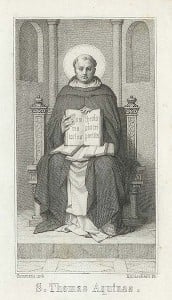 We’re blogging through St. Thomas Aquinas’ Compendium Theologiae, sometimes called his Shorter Summa. Find the previous posts here.
We’re blogging through St. Thomas Aquinas’ Compendium Theologiae, sometimes called his Shorter Summa. Find the previous posts here.
Having described the generation of the Word by the Father, Thomas now goes on to discuss the procession of the Spirit from the Father and the Son.
As the object known is in the knower, to the extent that it is known, so the beloved must be in the lover, as loved.
We can only love what we know, though we might know it very imperfectly. To know a thing is to have that thing present in one’s intellect; and so the beloved, the thing loved, must also be present in one’s intellect prior to being loved with one’s will—loving, understood as an action rather than a feeling, is simply willing. It is always and only love that leads to action, any kind of action at all (even hatred of a thing implies love of something else). We love, and are moved by that love to act:
The, lover is, in some way, moved by the beloved with a certain interior impulse. Therefore, since a mover is in contact with the object moved, the beloved must be intrinsic to the lover. But God, just as He understands Himself, must likewise love Himself; for good, as apprehended, is in itself lovable. Consequently God is in Himself as beloved in lover.
In short, God not only knows His own perfection, but loving what is perfectly good loves that perfection with a fierce and abiding love. And since what is loved is in the lover in a way, so God is in Himself as beloved in lover.
_____
photo credit: Public Domain; source Wikimedia Commons









